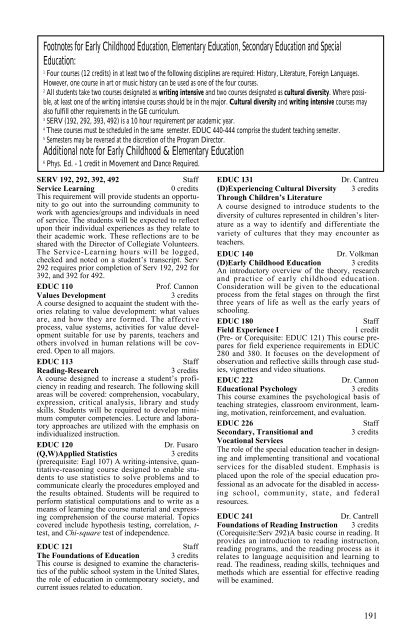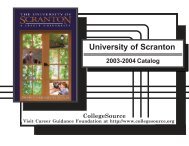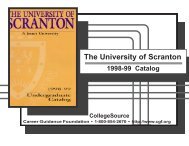You also want an ePaper? Increase the reach of your titles
YUMPU automatically turns print PDFs into web optimized ePapers that Google loves.
Footnotes for Early Childhood Education, Elementary Education, Secondary Education and Special<br />
Education:<br />
1 Four courses (12 credits) in at least two <strong>of</strong> the following disciplines are required: History, Literature, Foreign Languages.<br />
However, one course in art or music history can be used as one <strong>of</strong> the four courses.<br />
2 All students take two courses designated as writing intensive and two courses designated as cultural diversity. Where possible,<br />
at least one <strong>of</strong> the writing intensive courses should be in the major. Cultural diversity and writing intensive courses may<br />
also fulfill other requirements in the GE curriculum.<br />
3 SERV (192, 292, 393, 492) is a 10 hour requirement per academic year.<br />
4 <strong>The</strong>se courses must be scheduled in the same semester. EDUC 440-444 comprise the student teaching semester.<br />
5 Semesters may be reversed at the discretion <strong>of</strong> the Program Director.<br />
Additional note for Early Childhood & Elementary Education<br />
6 Phys. Ed. - 1 credit in Movement and Dance Required.<br />
SERV 192, 292, 392, 492 Staff<br />
Service Learning 0 credits<br />
This requirement will provide students an opportunity<br />
to go out into the surrounding community to<br />
work with agencies/groups and individuals in need<br />
<strong>of</strong> service. <strong>The</strong> students will be expected to reflect<br />
upon their individual experiences as they relate to<br />
their academic work. <strong>The</strong>se reflections are to be<br />
shared with the Director <strong>of</strong> Collegiate Volunteers.<br />
<strong>The</strong> Service-Learning hours will be logged,<br />
checked and noted on a student’s transcript. Serv<br />
292 requires prior completion <strong>of</strong> Serv 192, 292 for<br />
392, and 392 for 492.<br />
EDUC 110 Pr<strong>of</strong>. Cannon<br />
Values Development 3 credits<br />
A course designed to acquaint the student with theories<br />
relating to value development: what values<br />
are, and how they are formed. <strong>The</strong> affective<br />
process, value systems, activities for value development<br />
suitable for use by parents, teachers and<br />
others involved in human relations will be covered.<br />
Open to all majors.<br />
EDUC 113 Staff<br />
Reading-Research 3 credits<br />
A course designed to increase a student’s pr<strong>of</strong>iciency<br />
in reading and research. <strong>The</strong> following skill<br />
areas will be covered: comprehension, vocabulary,<br />
expression, critical analysis, library and study<br />
skills. Students will be required to develop minimum<br />
computer competencies. Lecture and laboratory<br />
approaches are utilized with the emphasis on<br />
individualized instruction.<br />
EDUC 120 Dr. Fusaro<br />
(Q,W)Applied Statistics 3 credits<br />
(prerequisite: Eagl 107) A writing-intensive, quantitative-reasoning<br />
course designed to enable students<br />
to use statistics to solve problems and to<br />
communicate clearly the procedures employed and<br />
the results obtained. Students will be required to<br />
perform statistical computations and to write as a<br />
means <strong>of</strong> learning the course material and expressing<br />
comprehension <strong>of</strong> the course material. Topics<br />
covered include hypothesis testing, correlation, ttest,<br />
and Chi-square test <strong>of</strong> independence.<br />
EDUC 121 Staff<br />
<strong>The</strong> Foundations <strong>of</strong> Education 3 credits<br />
This course is designed to examine the characteristics<br />
<strong>of</strong> the public school system in the United Slates,<br />
the role <strong>of</strong> education in contemporary society, and<br />
current issues related to education.<br />
EDUC 131 Dr. Cantreu<br />
(D)Experiencing Cultural Diversity 3 credits<br />
Through Children’s Literature<br />
A course designed to introduce students to the<br />
diversity <strong>of</strong> cultures represented in children’s literature<br />
as a way to identify and differentiate the<br />
variety <strong>of</strong> cultures that they may encounter as<br />
teachers.<br />
EDUC 140 Dr. Volkman<br />
(D)Early Childhood Education 3 credits<br />
An introductory overview <strong>of</strong> the theory, research<br />
and practice <strong>of</strong> early childhood education.<br />
Consideration will be given to the educational<br />
process from the fetal stages on through the first<br />
three years <strong>of</strong> life as well as the early years <strong>of</strong><br />
schooling.<br />
EDUC 180 Staff<br />
Field Experience I 1 credit<br />
(Pre- or Corequisite: EDUC 121) This course prepares<br />
for field experience requirements in EDUC<br />
280 and 380. It focuses on the development <strong>of</strong><br />
observation and reflective skills through case studies,<br />
vignettes and video situations.<br />
EDUC 222 Dr. Cannon<br />
Educational Psychology 3 credits<br />
This course examines the psychological basis <strong>of</strong><br />
teaching strategies, classroom environment, learning,<br />
motivation, reinforcement, and evaluation.<br />
EDUC 226 Staff<br />
Secondary, Transitional and 3 credits<br />
Vocational Services<br />
<strong>The</strong> role <strong>of</strong> the special education teacher in designing<br />
and implementing transitional and vocational<br />
services for the disabled student. Emphasis is<br />
placed upon the role <strong>of</strong> the special education pr<strong>of</strong>essional<br />
as an advocate for the disabled in accessing<br />
school, community, state, and federal<br />
resources.<br />
EDUC 241 Dr. Cantrell<br />
Foundations <strong>of</strong> Reading Instruction 3 credits<br />
(Corequisite:Serv 292)A basic course in reading. It<br />
provides an introduction to reading instruction,<br />
reading programs, and the reading process as it<br />
relates to language acquisition and learning to<br />
read. <strong>The</strong> readiness, reading skills, techniques and<br />
methods which are essential for effective reading<br />
will be examined.<br />
191
















